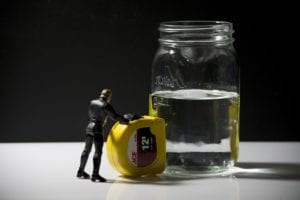 Everyone has fears and fear can certainly impact a person’s situational awareness. Some people are better at controlling their fears while others are controlled by their fears. Some people mask their fears well while others wear their fear on their sleeves. Some people live in denial of their fears and others face their fears and work tirelessly to manage or overcome them.
Everyone has fears and fear can certainly impact a person’s situational awareness. Some people are better at controlling their fears while others are controlled by their fears. Some people mask their fears well while others wear their fear on their sleeves. Some people live in denial of their fears and others face their fears and work tirelessly to manage or overcome them.
Healthy or unhealthy fear
Arguably, fear can be put into two categories: Healthy and unhealthy. Healthy fears can have a positive impact on situational awareness. For example, being aware that even though you are a cautious and responsible driver, there are others on the roads that may be operating motor vehicles in careless and irresponsible ways. A healthy fear of those drivers helps you maintain a heightened level of vigilance for their erratic driving behaviors.
Unhealthy fears can have a negative impact on situational awareness. For example, if the thought of being among careless and irresponsible drivers consumes your thinking and leaves you unable to operate a motor vehicle, you are gripped by an unhealthy fear that you may not be able to let go of. The unhealthy fear may occupy a considerable amount of your conscious awareness to the point of being debilitating.
The balance

In the business of emergency response there are many things that can harm responders. Some are immediate (e.g., violence or exposure to a chemical) and others may not impact you for many years (e.g., cancer or post-traumatic stress). The key to managing our fears is not to be consumed by them, yet to maintain a healthy respect for what can harm us.
Denial
Some responders live in denial. They believe that bad things only happen to those who are undertrained or who are acting irresponsibly. And while bad things may be more likely to happen to someone who is undertrained or acting irresponsibly, it does not mean those who are well-trained or who are acting responsibly are immune from bad outcomes.
 In the business of emergency response, bad things can happen to anyone at any time regardless of training or experience levels. Those who are in denial of this fact are likely to have challenges with situational awareness because they are incapable of seeing (or unwilling to admit) bad things can happen to them. And one cannot change (or avoid) what one cannot see. They have a proverbial blind spot.
In the business of emergency response, bad things can happen to anyone at any time regardless of training or experience levels. Those who are in denial of this fact are likely to have challenges with situational awareness because they are incapable of seeing (or unwilling to admit) bad things can happen to them. And one cannot change (or avoid) what one cannot see. They have a proverbial blind spot.
One of the important components in the development of situational awareness is being able to anticipate or “see” future outcomes through forecasting. A person in denial always sees the positive outcome of their actions and never the potential negative outcomes. A healthy level of fear allows a person to look into the future and anticipate bad outcomes before they happen. This can have a very beneficial impact on decision making.
The Optimist and the pessimist
 We are bombarded with feel-good messages on social media feeds about developing and maintaining a positive outlook. I’m all for being positive when looking toward the future. But not at the detriment of the potential reality of a bad outcome and certainly not without a plan for how to navigate the landmines we can face in the future.
We are bombarded with feel-good messages on social media feeds about developing and maintaining a positive outlook. I’m all for being positive when looking toward the future. But not at the detriment of the potential reality of a bad outcome and certainly not without a plan for how to navigate the landmines we can face in the future.
The optimist who focuses only on the successful outcome of an action may have a mental shortcoming that prevents their ability to anticipate bad outcomes. Likewise, a pessimist can be so focused on the bad outcomes of an action they may have a mental shortcoming that prevents their ability to see anything BUT a bad outcome.
Rich Gasaway’s Advice
 It is important to acknowledge the dangers of the job and it is certainly acceptable – even healthy – to have a certain level of fear. A person who does not have a healthy fear for what can kill them can be reckless. Likewise a person who has an unhealthy level of fear for what can kill them will be ineffective.
It is important to acknowledge the dangers of the job and it is certainly acceptable – even healthy – to have a certain level of fear. A person who does not have a healthy fear for what can kill them can be reckless. Likewise a person who has an unhealthy level of fear for what can kill them will be ineffective.
There needs to be a balance. The optimist should also give consideration to the looming realities of bad outcomes. No one should ever be of the mindset that bad things only happen to other responders or lesser trained responders, or incompetent responders. This simply is not true. Any student of the lessons learned from casualty reports knows all too well that bad things happen to very competent, very well-trained responders.
To the optimist: Acknowledge your mortal status, raise your vigilance, anticipate bad things before they happen and make a plan for how to navigate the landmines.
To the pessimist: Serving as a first responder is a dangerous vocation. No matter how much we try, it will never be possible to engineer or plan for all possible outcomes. Become a student of best practices and learn how the best in our field make action plans with consideration for the dangers.
Arguably, only a foolish person would blindly rush into a situation without a plan and without thinking about the potential for bad outcomes.
On this job, fear is not an indicator that you are weak or you are a coward. I once heard a highly decorated, battle-tested military officer say: If you go into battle without fear you’re either in denial or you’re a fool. Fear is a sign of healthy respect for what can kill you.
Action items
 1. Openly discuss the fears and concerns you have about your safety and the safety of others you work with. [HINT: If you open this dialog with your crew and no one is willing to share, step up and be the first to get the conversation started.]
1. Openly discuss the fears and concerns you have about your safety and the safety of others you work with. [HINT: If you open this dialog with your crew and no one is willing to share, step up and be the first to get the conversation started.]
2. Discuss a time when you had a near-miss (on or off the job) and you were fearful of the outcome. How did you overcome your fear? What impact did the fear have on you (at that time and over the long run)?
3. Discuss strategies for how to balance optimism and pessimism when operating under conditions of risk and consequence.
_____________________________________________________

If you are interested in taking your understanding of situational awareness and high-risk decision making to a higher level, check out the Situational Awareness Matters Online Academy.
CLICK HERE for details, enrollment options and pricing.
__________________________________
Share your comments on this article in the “Leave a Reply” box below. If you want to send me incident pictures, videos or have an idea you’d like me to research and write about, contact me. I really enjoy getting feedback and supportive messages from fellow first responders. It gives me the energy to work harder for you.
Thanks,

Email: Support@RichGasaway.com
Phone: 612-548-4424
SAMatters Online Academy
Facebook Fan Page: www.facebook.com/SAMatters
Twitter: @SAMatters
LinkedIn: Rich Gasaway
YouTube: SAMattersTV
iTunes: SAMatters Radio
